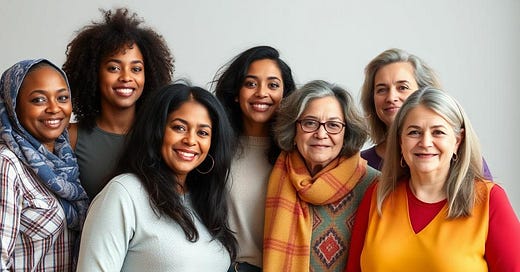Demi Moore’s Oscar Win Is Inspiring—But Are We Missing the Bigger Issue?
Age isn’t the barrier—society’s treatment of women is. Let’s talk about it.
Last month, the internet was buzzing about Demi Moore. At 60+, she won her first Golden Globe, and the message that spread like wildfire was one of triumph: “See? You can achieve anything at any age!”
It’s a nice sentiment. Encouraging, even. And on the surface, it feels like the kind of message we should all embrace. But when I sat with it for a while, something didn’t sit right.
Because the real question isn’t Can women succeed at any age?—of course they can. The real question is: Why do women have to wait this long for their flowers in the first place?
When “You Can Do Anything at Any Age” Misses the Point
I understand why people gravitate toward this narrative. It gives hope, it feels uplifting, and it counters the fear that success has an expiration date. But here’s the problem: the fact that Demi Moore winning an Oscar at 60+ is treated as some extraordinary exception says more about how society treats women than it does about perseverance.
I couldn’t help but think—if talent alone dictated success, she wouldn’t have had to wait decades for this moment. She wouldn’t have had to fight to remain relevant while her male counterparts aged into "distinguished" leading roles without missing a beat.
And yet, instead of questioning why women are so often pushed aside in the first place, we celebrate her win as proof that "See? Women can still make it later in life!"
It reminds me of when people say, "Look at this 80-year-old woman who ran a marathon—see, you have no excuse!" And all I can think is… why is it framed as an exceptional thing? Why does a woman have to prove she is the outlier to be worthy of recognition? Shouldn’t we be asking why it’s so rare in the first place?
The Deeper Issue: How Society Erases Women as They Age
Demi Moore’s story is about more than persistence. It’s a reflection of a much bigger issue: how women, especially in industries like Hollywood, are systematically sidelined as they get older.
While men in their 50s and 60s continue to land leading roles, women of the same age are quietly pushed into the background—if they’re cast at all. They go from being love interests to playing someone’s mother, and then, eventually, they just disappear from the screen altogether.
And this isn’t just about Hollywood. The erasure of women as they age happens everywhere:
In the workplace: Women in their 40s and 50s often face professional stagnation, while their male colleagues continue climbing the ranks.
In relationships: We’ve all seen how older men are often seen as "distinguished," while women are pressured to chase youth or risk being overlooked.
In cultural narratives: Look at the industries that profit off women feeling like they must stay youthful—anti-aging products, cosmetic procedures, filters that smooth out every fine line. Meanwhile, men are praised for their graying hair and "rugged" looks.
I’ve seen this dynamic in so many ways, even outside of Hollywood. I’ve seen brilliant women being passed over for opportunities in favour of a younger, less experienced person simply because she "looks fresher." I’ve watched women in their 50s and 60s get dismissed as if they have nothing left to contribute, while men their age are seen as wise and seasoned.
This is the system we’re up against. So when we celebrate moments like Demi Moore’s Oscar win as proof that “anything is possible,” we risk ignoring the bigger issue: it shouldn’t have taken this long for her to be recognised in the first place.
Let’s Shift the Conversation
I don’t want to take away from the joy of her win—she deserves it. But what if we stopped treating these moments as proof that the system is working and started questioning why the system is built this way in the first place?
Instead of saying, "See? You can do anything at any age!" let’s ask:
Why do women have to work twice as hard and wait twice as long for recognition?
Why do we glorify the exceptions instead of changing the rules for everyone?
Why do we accept that women are lucky to still be thriving in their later years, while men are simply expected to?
Because the goal isn’t to celebrate women for beating the system. The goal should be to dismantle the system entirely.
This Is the Work of Becoming
When I talk about Quietly Becoming, this is exactly what I mean. It’s the process of unlearning the stories we’ve been told and asking better questions. It’s about seeing the world differently—beyond the surface-level narratives—and thinking critically about the things we’ve been taught to accept.
This isn’t just about ageism or Hollywood. It’s about how we, as individuals, as a society, decide what has value.
And maybe the real becoming is in rewriting these narratives entirely—not just for ourselves, but for the generations coming after us.
With love,
Salwa






Thank you for this very thoughtful piece Salwa. It’s that unspoken sense of shock and awe that gets me. “You mean women can still do this? At this age?” Like we’re expected to curl up and wither as we get older. I’m in my late 50’s and certifying as a counsellor. I have every intention of taking space and growing older disgracefully. Of disgracefully means continuing to be curious, always ready to learn and refusing to go “quietly into the night”
I love this, Salwa, and I was talking about this - not Demi - but this topic the other day with another woman writer who said, women do it to women as much as men do it to women. Which is sad.